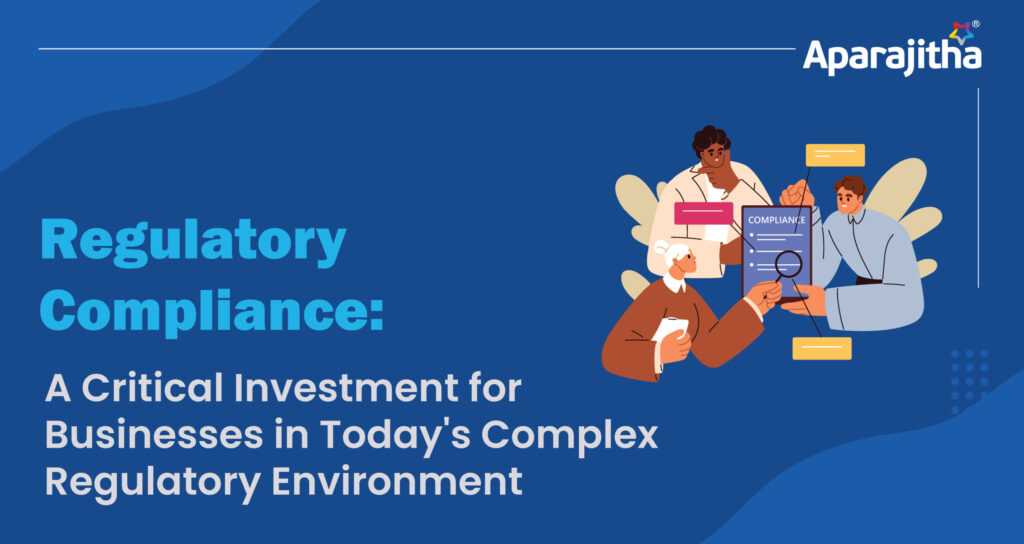The current business landscape is nothing like decades or even a few years ago. Several sweeping changes have shifted the way companies do business. Of these changes, regulatory compliance has emerged as a transformative force that has positively impacted the perception and implementation of business practices.
Regulatory compliance has transcended from being a mere legal obligation into a strategic imperative for businesses of all sizes. Much of this is due to an ever-evolving, intricate web of regulations and standards adopted by different governments worldwide.
One wrong move can result in significant legal and financial penalties to the company, not to mention long-drawn legal entanglements and severe loss of reputation for the company. This scenario has pushed companies to adopt a more robust system that ensures adherence to various legal frameworks.
This process and its associated methods are referred to as regulatory compliance. Regulatory compliance is more than just a requirement – it’s a critical investment into the company’s future successes.
Benefits of Regulatory Compliance
- Improved Operational Efficiency
Regulatory compliance is a vital part of simplifying the company’s internal processes. Pushing for compliance ensures a business follows industry best practices resulting in reduced operational redundancy. It also allows better resource allocation and thereby improved productivity. Adhering to proper compliance requirements results in smoother operations with lower chances of errors.
- All-Encompassing Legal Protection
Several companies today overlook one of the most vital benefits regulatory compliance offers – legal protection. When you implement regulatory compliance, it ensures that businesses follow relevant laws and industry standards. A robust compliance framework can save your company against legal issues thereby keeping you safe from fines, lawsuits and other penalties.
- In-depth Reputation Strengthening
Any business needs a high reputation score to do well in the market. Regulatory compliance can give businesses of any size a huge boost to their trust factor and reputation. Strong compliance processes enforce businesses to follow best standards and showcase their commitment to ethical business practices.
- Noticeable Competitive Advantage
Another area where regulatory compliance scores with businesses today is its ability to improve their competitiveness in the marketplace. When you carry out regulatory compliance for your business, it creates an impression among your customers which improves your performance against your competition.
- Fail-proof Risk Mitigation
Any company has to deal with risk management if it wants to be successful. But the problem with risk analysis today is that there are several factors that can influence the success of a company. Regulatory compliance provides considerable protection against risks by ensuring businesses follow strict guidelines and protocols.
- High Global Scalability
Regulatory compliance plays a huge part when a business wants to expand. The ability of a business to scale is directly tied to the number of regulations it can comply with. It becomes critical for a business to be aware of specific areas of compliance prevalent in other parts of the world in order to operate successfully in their markets.
Ways to Ensure Regulatory Compliance
- Develop Robust Policies
Companies should focus on creating a strong set of policies – it should be the first step towards ensuring regulatory compliance. The top people in the company should vet these policies. There needs to be several checks in place to ensure they align with relevant laws and prevailing industry standards.
- Provide Compliance Training
Compliance training for your employees needs to be a regular and mandated process across all levels. Regular training sessions can improve employee understanding and instills a sense of purpose towards following guidelines for better compliance. It encourages them to follow protocols without needing to micro-manage them.
- Conduct Regular Audits
A part of the success of compliance is conducting regular audits that ensures all checks are in place. A detailed audit can help identify problem areas and improve the effectiveness of internal processes. Generating reports based on these audits can help companies pre-emptively address issues and correct their processes.
- Implement Technology Integration
Compliance assessment has become a board and complex task today. Manual compliance checks can sometimes result in lapses and errors and this is where technology can help. There are several automated compliance monitoring platforms that can guide businesses to a more streamlined process. Some of the more advanced ones can also take corrective actions.
- Enforce Strong Data Protection
The need of the hour for companies today with regards to compliance has been user data protection. The onus is on businesses to protect client data and is a vital part of the entire compliance infrastructure. Regulatory compliance ensures that there are strong data protection measures in place.
- Create Collaborative Relationships
Trying to navigate through the complex regulatory landscape can be tough without outside help. Today’s businesses should aim to create collaborative relationships with industry peers, legal experts, and relevant regulatory bodies. It ensures that businesses stay informed about sudden shifts in regulations.
Trends in Regulatory Compliance
- Digital Evolution
As part of the digital evolution, more companies are looking towards automated compliance measures and even AI. Traditional, manual compliance procedures were time-consuming and sometimes even inaccurate. They are also vulnerable to compliance violations due to changes. Automated regulatory compliance ensures reduced risk and much lower response times.
- ESG Reporting
Environmental, Social, and Governance reporting has gained prominence as a key trend in regulatory compliance. It is normal for companies to be pressured by stakeholders towards better sustainability. Regulatory compliance focuses on creating a social impact while improving the trust factor of companies.
- Cybersecurity Regulations
Considering the rapid growth of cyber threats and data breaches, global governments are enacting stricter cybersecurity regulations. These regulations mandate specific security and data protection standards that push companies to invest in robust cybersecurity and incident response.
- Data Privacy Regulations
Data protection and the right to privacy has been one of the foremost issues brought about by people with businesses worldwide. Customers are increasingly concerned about how data is being used and what kind of information is being collected. Regulatory compliance focuses on protecting user information while only collecting required data.
- Supply Chain Transparency
More companies are focusing on showcasing their entire supply chain to their customers and stakeholders. People want to know exactly how and where companies are sourcing their raw materials, through which companies goods are being transported, and how sustainable it is for the planet.
- Regulatory Technology Adoption
A huge leap into the future for regulatory compliance has been the adoption of regulatory technology or RegTech for short. The purpose of RegTech is to offer a significantly streamlined experience for companies who are new to regulatory compliance. It lowers errors and reduces downtime.
Measuring the Effectiveness of Regulatory Compliance
- Code and Policy Reviews
As part of the regulatory compliance process, companies need to regularly check and review compliance codes to confirm they are aligned with evolving regulatory norms and business goals. Care should be taken to ensure updates happen on a regular basis.
- Issue Reporting Rates
The rate of issues reported should be tracked and recorded. Compliance officers should regularly evaluate the reporting rate of issues that are related to compliance within the company. This can also help assess how effective compliance training has been for the employees.
- Training Session Engagement
Another important metric for regulatory compliance is the number of people who engage with compliance training sessions. Training program updates should also be taken into account and ensure they are carried out periodically.
- Knowledge Assessment and Surveys
Regular surveys and employee assessments should be conducted by compliance officers. These assessments are an important tool to determine how well employees are adjusting to new compliance processes and their effectiveness.
Partnering with Aparajitha for Regulatory Compliance Management
Aparajitha, India’s most reliable compliance service provider with a Pan-India presence focuses on the Labour, Employee, and Industrial (LEI), Fiscal, Corporate, and Commercial (FCC), and Environment, Health, and Safety (EHS) related compliance services.
Our Automated Software, Simpliance, provides technology-based governance, risk, and compliance solutions to organisations varying from large corporates to start-ups. Our GRC tools for risk management, regulatory compliance, and audit optimise your business performance.







